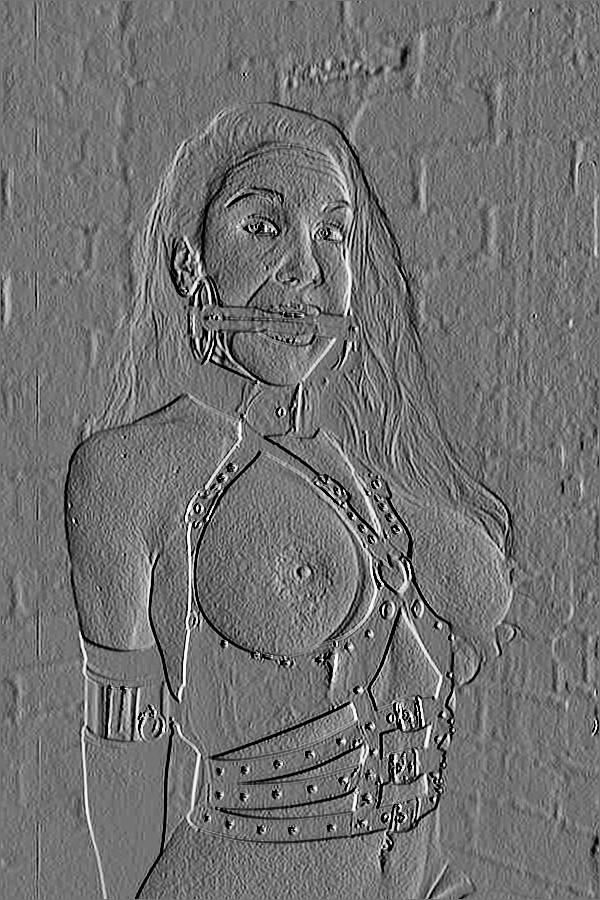A Solid Foundation for Ponygirl Training
by Master M. Walker
- do not use without the author's permission.

|
A solid foundation of groundwork is crucial in order to have a joined at the hip ponygirl/master relationship. The huge percentage of pony problems are incredibly lacking in groundwork. Most have none. When is the last time you did prolonged lunge work with your ponygirl?
A trained eye can look at a pony/master pair and tell whether or not the two have a solid groundwork foundation.
If I ask about groundwork the master usually glosses over it by saying, "I have no trouble with her in the bedroom, it's when I'm out on the trails that I have problems." To the vast majority of ponygirl groundwork consists of leading, tying, grooming, position training and the like. Simple work outs can be greatly beneficial. An hour a week on the lunge line can correct much of the resistance that pony owners experience.
Most pony trainers confuse handling with groundwork. But groundwork is so much more than handling.
Groundwork is being able to direct the pony to do from dressage what you expect to do on the track. Groundwork is actually teaching the pony, from a position of greater control and safety, in short play times, to do what you are going to ask the pony to do once you are on the pony or when you are sitting in the cart or carriage actually driving her.
|
Groundwork strengthens the pony/master relationship by giving a psychological benefit to pony and rider because the trainer/rider's mental, physical presence and strength is solidly presented to her. This opens up a strong mental bond and increases confidence and trust.
Groundwork strengthens the pony/master relationship by gradually introducing inexperienced ponygirls to being trained to work and accept trainer's direction to accomplish a task. It teaches the recently started pony to accept the trainer, his thought processes (providing they are constructive thought processes) and to learn how to comply with the trainer's wishes.
Groundwork strengthens the pony/master relationship by helping the pony become physically fit. Groundwork develops the muscles that are used by the pony to carry the rider or do whatever work that may be asked of her whether it be cart pulling, dressage, or even heavy farm work.
Groundwork provides an exercise tool when some condition prevents the pony from being normally worked when the trainer or rider may not be able ride or the pony has some injury or problem that does not allow her to work under saddle or harness.
Groundwork is an ideal way to judge the pony's compliance, behavior, mood and movement before riding or driving. This is especially important with strange ponygirls of unknown or doubtful histories. Groundwork serves as a pre-flight to assess the pony's controls. I'm stunned by the percentage of people who will take on a pony accepting the word of often complete strangers about her training and suitability. Many of the people who seek advice after an unfortunate incident did exactly that.
For those who have had a pony in training for some time its extremely important to remember that groundwork simplifies the re-training of spoiled and or sour ponies by providing more assertive and anchored directions to her.
Groundwork allows the handler/rider to observe the pony at work at the most simple level. This gives a view of the girl's expression, balance, form and gaits not seen from the saddle or cart.
Groundwork also serves as a tool to introduce the pony to new areas such as another trainer's stable or to show grounds or camps. It calms the pony by asking her to perform known tasks while allowing it to become acquainted with her new surroundings as it relaxes and calms.
Groundwork is incredibly helpful in restoring the trainer's nerve after an unfortunate setback or while beginning with a new pony. This allows the speed of the progress to be more easily controlled by the trainer or instructor.
And finally, the most important benefit of groundwork is the ability to improve the trainer's confidence, balance, form and flexibility and improve the rider's understanding and use of thought, weight, leg, rein and voice aids and to sharpen mental and physical feel. New pony masters often find time on the lunge to be demeaning, while the true pony trainer cherishes the time to polish saddle skills, balance and form.
There is a world of difference between being a fan and being a dyed in the wool pony person. Fans operate in a very narrow (often merely erotic) restricted area that leaves little room for flexibility and adjustment. Riders focus on being passengers, pony people develop a wide range of ingredients they can use at will in their riding recipe and groundwork is an essential part of the psychological depths of pony play.
